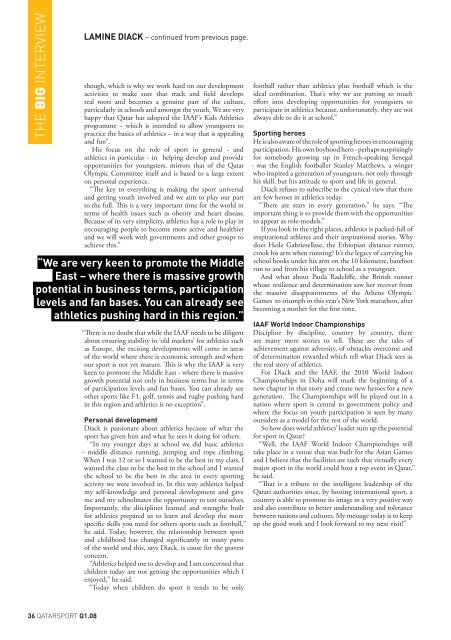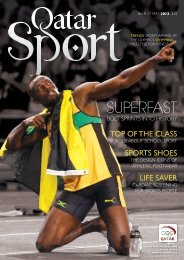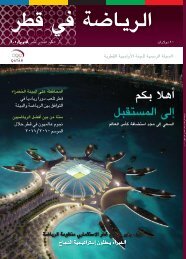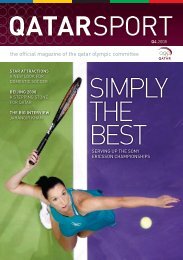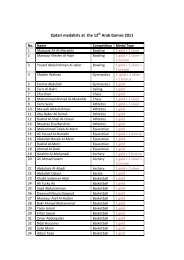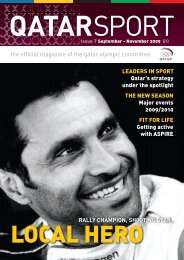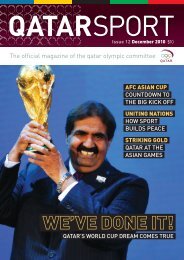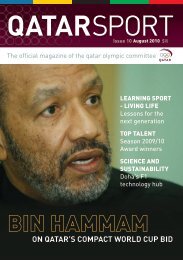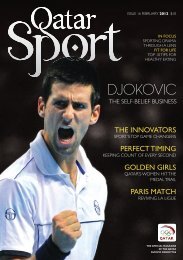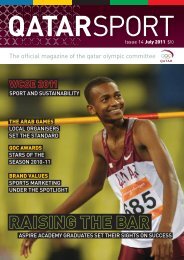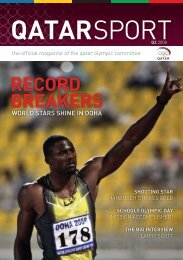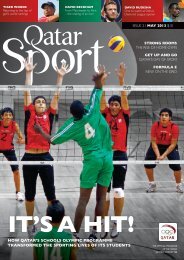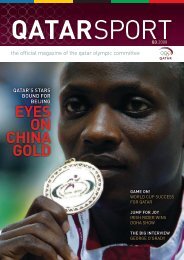JUSTINE EYES DOHA RETURN - Qatar Olympic Committee
JUSTINE EYES DOHA RETURN - Qatar Olympic Committee
JUSTINE EYES DOHA RETURN - Qatar Olympic Committee
Create successful ePaper yourself
Turn your PDF publications into a flip-book with our unique Google optimized e-Paper software.
the big interview<br />
Lamine Diack – continued from previous page.<br />
though, which is why we work hard on our development<br />
activities to make sure that track and field develops<br />
real roots and becomes a genuine part of the culture,<br />
particularly in schools and amongst the youth. We are very<br />
happy that <strong>Qatar</strong> has adopted the IAAF’s Kids Athletics<br />
programme – which is intended to allow youngsters to<br />
practice the basics of athletics – in a way that is appealing<br />
and fun”.<br />
His focus on the role of sport in general - and<br />
athletics in particular - in helping develop and provide<br />
opportunities for youngsters, mirrors that of the <strong>Qatar</strong><br />
<strong>Olympic</strong> <strong>Committee</strong> itself and is based to a large extent<br />
on personal experience.<br />
“The key to everything is making the sport universal<br />
and getting youth involved and we aim to play our part<br />
to the full. This is a very important time for the world in<br />
terms of health issues such as obesity and heart disease.<br />
Because of its very simplicity, athletics has a role to play in<br />
encouraging people to become more active and healthier<br />
and we will work with governments and other groups to<br />
achieve this.”<br />
“We are very keen to promote the Middle<br />
East – where there is massive growth<br />
potential in business terms, participation<br />
levels and fan bases. You can already see<br />
athletics pushing hard in this region.”<br />
“There is no doubt that while the IAAF needs to be diligent<br />
about ensuring stability in ‘old markets’ for athletics such<br />
as Europe, the exciting developments will come in areas<br />
of the world where there is economic strength and where<br />
our sport is not yet mature. This is why the IAAF is very<br />
keen to promote the Middle East - where there is massive<br />
growth potential not only in business terms but in terms<br />
of participation levels and fan bases. You can already see<br />
other sports like F1, golf, tennis and rugby pushing hard<br />
in this region and athletics is no exception”.<br />
Personal development<br />
Diack is passionate about athletics because of what the<br />
sport has given him and what he sees it doing for others.<br />
“In my younger days at school we did basic athletics<br />
- middle distance running, jumping and rope climbing.<br />
When I was 12 or so I wanted to be the best in my class, I<br />
wanted the class to be the best in the school and I wanted<br />
the school to be the best in the area in every sporting<br />
activity we were involved in. In this way athletics helped<br />
my self-knowledge and personal development and gave<br />
me and my schoolmates the opportunity to test ourselves.<br />
Importantly, the disciplines learned and strengths built<br />
for athletics prepared us to learn and develop the more<br />
specific skills you need for others sports such as football,”<br />
he said. Today, however, the relationship between sport<br />
and childhood has changed significantly in many parts<br />
of the world and this, says Diack, is cause for the gravest<br />
concern.<br />
“Athletics helped me to develop and I am concerned that<br />
children today are not getting the opportunities which I<br />
enjoyed,” he said.<br />
“Today when children do sport it tends to be only<br />
football rather than athletics plus football which is the<br />
ideal combination. That’s why we are putting so much<br />
effort into developing opportunities for youngsters to<br />
participate in athletics because, unfortunately, they are not<br />
always able to do it at school.”<br />
Sporting heroes<br />
He is also aware of the role of sporting heroes in encouraging<br />
participation. His own boyhood hero - perhaps surprisingly<br />
for somebody growing up in French-speaking Senegal<br />
- was the English footballer Stanley Matthews, a winger<br />
who inspired a generation of youngsters, not only through<br />
his skill, but his attitude to sport and life in general.<br />
Diack refuses to subscribe to the cynical view that there<br />
are few heroes in athletics today.<br />
“There are stars in every generation,” he says. “The<br />
important thing is to provide them with the opportunities<br />
to appear as role-models.”<br />
If you look in the right places, athletics is packed-full of<br />
inspirational athletes and their inspirational stories. Why<br />
does Heile Gabriesellase, the Ethiopian distance runner,<br />
crook his arm when running? It’s the legacy of carrying his<br />
school books under his arm on the 10 kilometre, barefoot<br />
run to and from his village to school as a youngster.<br />
And what about Paula Radcliffe, the British runner<br />
whose resilience and determination saw her recover from<br />
the massive disappointments of the Athens <strong>Olympic</strong><br />
Games to triumph in this year’s New York marathon, after<br />
becoming a mother for the first time.<br />
IAAF World Indoor Championships<br />
Discipline by discipline, country by country, there<br />
are many more stories to tell. These are the tales of<br />
achievement against adversity, of obstacles overcome and<br />
of determination rewarded which tell what Diack sees as<br />
the real story of athletics.<br />
For Diack and the IAAF, the 2010 World Indoor<br />
Championships in Doha will mark the beginning of a<br />
new chapter in that story and create new heroes for a new<br />
generation. The Championships will be played out in a<br />
nation where sport is central to government policy and<br />
where the focus on youth participation is seen by many<br />
outsiders as a model for the rest of the world.<br />
So how does world athletics’ leader sum up the potential<br />
for sport in <strong>Qatar</strong>?<br />
“Well, the IAAF World Indoor Championships will<br />
take place in a venue that was built for the Asian Games<br />
and I believe that the facilities are such that virtually every<br />
major sport in the world could host a top event in <strong>Qatar</strong>,”<br />
he said.<br />
“That is a tribute to the intelligent leadership of the<br />
<strong>Qatar</strong>i authorities since, by hosting international sport, a<br />
country is able to promote its image in a very positive way<br />
and also contribute to better understanding and tolerance<br />
between nations and cultures. My message today is to keep<br />
up the good work and I look forward to my next visit!”<br />
36 <strong>Qatar</strong>Sport Q1.08


